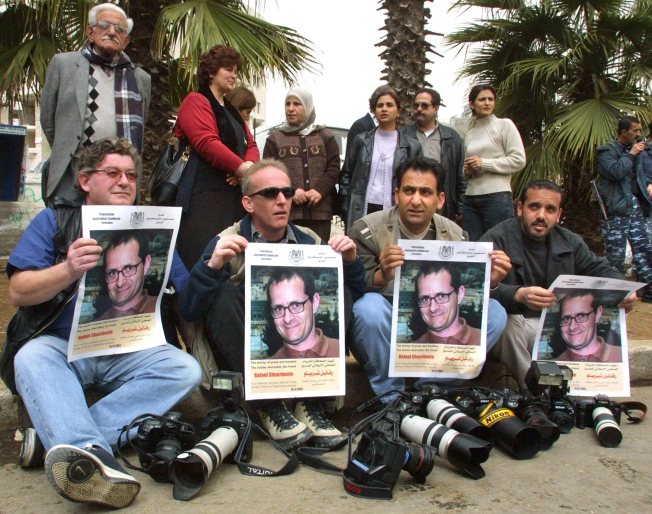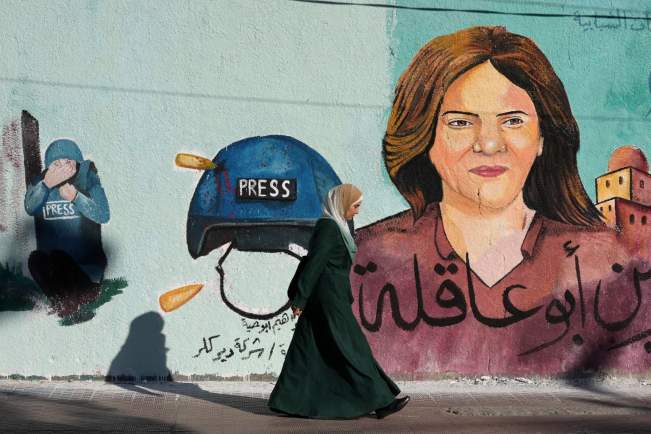Deadly Pattern: 20 journalists died by Israeli military fire in 22 years
No one has been held accountable
- English
In this Report
The May 11, 2022, killing of Al-Jazeera Arabic correspondent Shireen Abu Akleh is part of a deadly, decades-long pattern. Over 22 years, CPJ has documented at least 20 journalist killings by members of the Israel Defense Forces. Despite numerous IDF probes, no one has ever been charged or held responsible for these deaths. The impunity in these cases has severely undermined the freedom of the press, leaving the rights of journalists in precarity. A CPJ special report.
Introduction
On May 11, 2022, Palestinian American television journalist Shireen Abu Akleh embarked on what would be her final assignment. At 6:31 a.m., she walked down a neighborhood road in the Israeli-occupied West Bank city of Jenin. She was accompanied by two other Palestinian journalists and her producer, Ali al-Samoudi. The group wore protective vests with the word “PRESS” in large white letters across their chests and backs. Ahead they could see several Israeli military vehicles.
The journalists were there to report on the aftermath of an Israeli raid in the Jenin refugee camp after a string of deadly attacks by Palestinians in Israel. Video recorded by TikTok users and republished by The Washington Post showed Abu Akleh, a veteran Al-Jazeera Arabic correspondent, and her colleagues on the street. In the minutes before, the area was relatively quiet as local residents milled about, save for the sound of gunfire in the distance.
Suddenly, six shots rang out, one of them hitting al-Samoudi in the shoulder. The journalists ducked for cover and there was a second volley of fire. A bullet hit Abu Akleh in the back of her head in the gap between her helmet and her protective vest, killing her instantly. Several independent investigations by U.S. news outlets, including The New York Times, The Washington Post, and The Associated Press, as well as Netherlands-based research collective Bellingcat, all came to the same conclusion: a member of the Israel Defense Forces likely fired the shot. CNN found evidence of a targeted attack. The London-based research group Forensic Architecture and the Ramallah-based human rights organization Al-Haq also found evidence that the Israeli army targeted Abu Akleh and her journalist colleagues with the intention to kill.
Five months after the killing, an IDF probe concluded there was a “high possibility” that one of its soldiers “accidentally” shot the journalist while firing on Palestinian gunmen, but did not rule out the possibility that she was shot by a Palestinian militant. To date, no one has been held accountable.
Test title 1
Test title 2
Test title 2
The Torch
The high risks of reporting the Israel-Hamas war
The Israel-Gaza conflict has unleashed hostility, new censorship measures, and deadly physical risk, making reporting on the war exceptionally challenging, with little sign of abating at a time when it is critical for facts to shed light in the fog of war. 🚨 The escalating conflict has resulted in the deadliest two-week period for journalists…
Read StoryPost
3 Palestinian journalists killed, 1 injured, 2 missing, in Gaza-Israel conflict
New York, October 9, 2023—The Committee to Protect Journalists said on Monday that it was deeply disturbed by reports that at least six journalists were among the civilians who were killed, injured or missing in the ongoing conflict between Israel and Gaza. On Saturday, two Palestinian journalists were shot dead while out reporting—Ibrahim Mohammad Lafi,…
Read Story“Abu Akleh’s story is a case study in how Israel often discounts evidence reported in the news and elsewhere.”
39
24
72
16
Killed
Injured
Imprisoned
Missing
We investigate all reports of journalists and media workers killed, injured, or missing in the war, which has led to the deadliest month for journalists since CPJ began gathering data in 1992.

Israel discounts evidence and witness claims
The New York Times said it reviewed evidence that “contradicted Israeli claims that, if a soldier had mistakenly killed her, it was because he had been shooting at a Palestinian gunman.” The Associated Press noted that the “only confirmed presence of Palestinian militants was on the other side of the [Israeli military] convoy, some 300 meters… away, mostly separated from Abu Akleh by buildings and walls. Israel says at least one militant was between the convoy and the journalists, but it has not provided any evidence or indicated the shooter’s location.” Additional investigations by The Washington Post, CNN, and research collective Bellingcat showed a lack of militant activity in the area at the time of the shooting.
“Abu Akleh’s story is a case study in how Israel often discounts evidence reported in the news and elsewhere. “
Abu Akleh’s story is a case study in how Israel often discounts evidence reported in the news and elsewhere. Early on in its probe, the IDF released initial findings raising the possibility that a soldier may have killed the journalist when responding to Palestinian gunfire. But news organizations quickly poked holes in this narrative.

CPJ’s Recommendations
The pattern of journalist killings by the Israeli military constitutes a grave threat to press freedom, undermining journalists’ ability to report the news freely and safely. CPJ calls on Israel, the United States, and the international community to implement the following recommendations to protect journalists, end impunity in the cases of killed journalists, and prevent future killings.
To Israel
- Arcu risus ac pulvinar urna efficitur est. Vehicula cras congue feugiat eros; mi ac amet efficitur. Arcu ante primis ad mi consectetur praesent placerat mus tortor. Est non consectetur rutrum cursus libero risus magna. Inceptos nascetur eros conubia integer litora sodales vulputate dolor. Vitae nostra nullam facilisi tortor sem maecenas. Curae mollis sollicitudin ex felis a eget tortor potenti.
- Arcu risus ac pulvinar urna efficitur est. Vehicula cras congue feugiat eros; mi ac amet efficitur. Arcu ante primis ad mi consectetur praesent placerat mus tortor. Est non consectetur rutrum cursus libero risus magna. Inceptos nascetur eros conubia integer litora sodales vulputate dolor. Vitae nostra nullam facilisi tortor sem maecenas. Curae mollis sollicitudin ex felis a eget tortor potenti.
- Arcu risus ac pulvinar urna efficitur est. Vehicula cras congue feugiat eros; mi ac amet efficitur. Arcu ante primis ad mi consectetur praesent placerat mus tortor. Est non consectetur rutrum cursus libero risus magna. Inceptos nascetur eros conubia integer litora sodales vulputate dolor. Vitae nostra nullam facilisi tortor sem maecenas. Curae mollis sollicitudin ex felis a eget tortor potenti.
To The United States
- Arcu risus ac pulvinar urna efficitur est. Vehicula cras congue feugiat eros; mi ac amet efficitur. Arcu ante primis ad mi consectetur praesent placerat mus tortor. Est non consectetur rutrum cursus libero risus magna. Inceptos nascetur eros conubia integer litora sodales vulputate dolor. Vitae nostra nullam facilisi tortor sem maecenas. Curae mollis sollicitudin ex felis a eget tortor potenti.
- Arcu risus ac pulvinar urna efficitur est. Vehicula cras congue feugiat eros; mi ac amet efficitur. Arcu ante primis ad mi consectetur praesent placerat mus tortor. Est non consectetur rutrum cursus libero risus magna. Inceptos nascetur eros conubia integer litora sodales vulputate dolor. Vitae nostra nullam facilisi tortor sem maecenas. Curae mollis sollicitudin ex felis a eget tortor potenti.
- Arcu risus ac pulvinar urna efficitur est. Vehicula cras congue feugiat eros; mi ac amet efficitur. Arcu ante primis ad mi consectetur praesent placerat mus tortor. Est non consectetur rutrum cursus libero risus magna. Inceptos nascetur eros conubia integer litora sodales vulputate dolor. Vitae nostra nullam facilisi tortor sem maecenas. Curae mollis sollicitudin ex felis a eget tortor potenti.
Credits
Orly Halpern is the reporter and analyst of this report. She is a Jerusalem-based investigative journalist and TV news producer who has worked across the Middle East and Africa and has reported from conflict zones, including in Israel and the Palestinian territories, Iraq, and Afghanistan. She has worked for global broadcasters and has written for major international outlets including Time magazine, The Washington Post, and Foreign Policy. She holds a bachelor’s degree in international relations and in Middle East studies and Islam from The Hebrew University of Jerusalem. She speaks English, Hebrew, and Arabic.
Naomi Zeveloff, CPJ’s features editor, edited this report. Prior to joining CPJ in 2020, Zeveloff reported for six years from Israel and the Palestinian territories, first as The Forward’s Middle East correspondent and later as a freelancer for outlets such as NPR, The Atlantic, and Foreign Policy. She was also previously The Forward’s deputy culture editor in New York. Originally from Ogden, Utah, she began her career in journalism in the American West, reporting for newsweeklies in Salt Lake City, Colorado Springs, Denver, and Dallas. She holds a bachelor’s degree in political science from Colorado College and a Master of Arts in political journalism from Columbia Journalism School.



